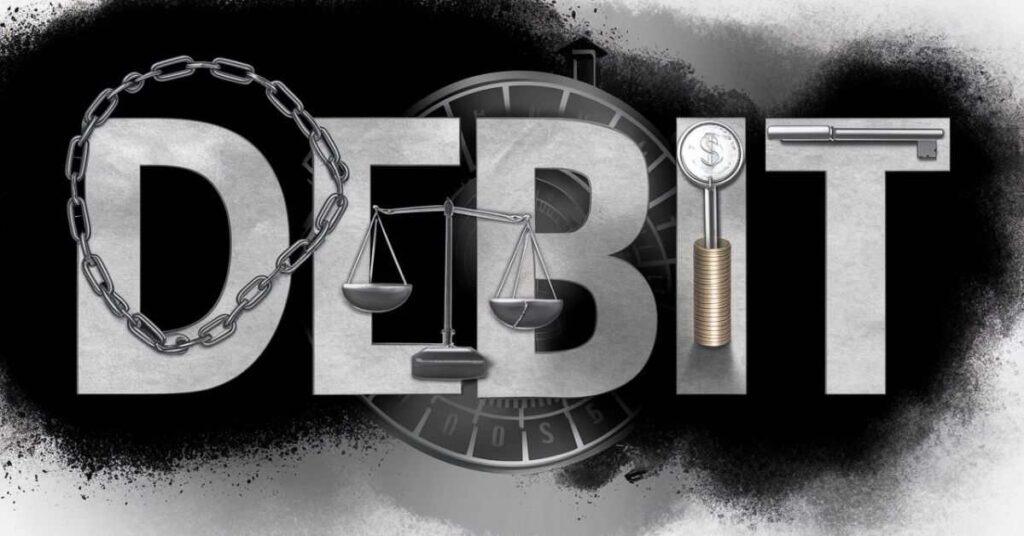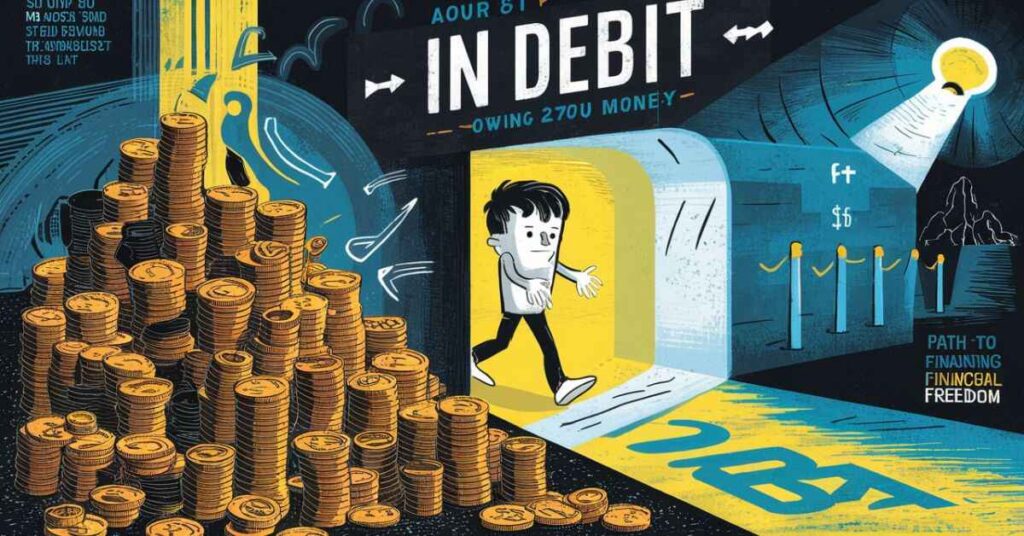Are you puzzled by the term “in debit” on your account statement? You’re not alone. Many Americans grapple with this financial jargon, often mistaking it for a simple negative balance. But there’s more to being in debit than meets the eye. Let’s dive into the world of debits, and credits, and why you might owe money without having to pay it back immediately. In Debit Meaning: You Owe, But Don’t Have to Pay. Find Out Why.
Key Takeaways
- In debit means you owe money or have a negative balance
- Various accounts can show debit balances, including bank, credit card, and investment accounts
- Being in debit doesn’t always require immediate payment
- Understanding “in debit” can help you manage your finances more effectively
What Does In Debit Mean?
At its core, “in debit” is an accounting term that indicates a negative balance or an amount owed. It’s the opposite of being “in credit,” which means you have a positive balance. When your account is in debit, it typically means you’ve spent more money than you have available.
Let’s break it down with an example:
Imagine you have $100 in your checking account. You buy groceries for $120 using your debit card. After this transaction, your account is “in debit” by $20. You owe the bank $20, but here’s the kicker – you might not have to pay it back immediately.
What Other Accounts Use ‘In Debit’?
The concept of being “in debit” isn’t limited to your checking account. It applies to various financial scenarios:
Bank Accounts
Your savings and checking accounts can go into debit when you withdraw more than your available balance. This often results in overdraft fees unless you have overdraft protection.
Credit Card Accounts
Surprisingly, credit cards can also be in debit. This happens when you overpay your bill or receive a refund that exceeds your balance. In Debit Meaning: You Owe, But Don’t Have to Pay. Find Out Why.
Merchant Accounts
Businesses use merchant accounts to process customer payments. These can go into debit due to chargebacks or refunds.
Related Post: In Debit Meaning: You Owe, But Don’t Have to Pay. Find Out Why
Trading and Investment Accounts
When you short-sell stocks or use margin trading, your investment account can show a debit balance.
Overdraft Accounts
These are designed to allow you to spend more than you have, putting your account into a planned debit status.
Expense Accounts
In corporate accounting, expense accounts are typically in debit as they represent money spent by the company.
Loans and Debts
Your mortgage or student loan balance is essentially a debit balance – money you owe to the lender.
Reasons for Being In Debit
There are several reasons why your account might end up in debit:
- Unexpected expenses
- Timing issues between deposits and withdrawals
- Automatic payments that exceed your balance
- Bank errors (rare, but they happen)
- Fraudulent activity on your account
Impact on Your Finances and Credit Score

Being in debit can have both short-term and long-term consequences:
Short-term impacts:
- Overdraft fees
- Temporary loss of account access
- Bounced checks
Long-term impacts:
- Negative marks on your ChexSystems report
- Potential closure of your account
- Difficulty opening new accounts
It’s important to note that not all debit situations affect your credit score. For instance, a temporarily overdrawn checking account won’t impact your credit. However, if the bank sends your negative balance to collections, that will likely show up on your credit report.
Managing Your Account in Debit
If you find yourself in debit, don’t panic. Here’s what you can do:
- Contact your bank immediately: They may waive fees if it’s your first offense.
- Deposit funds ASAP: The quicker you bring your account positive, the better.
- Review your transactions: Ensure there’s no fraudulent activity.
- Set up balance alerts: Many banks offer text or email notifications when your balance drops below a certain amount.
Requesting a Refund
Sometimes, being in debit is due to an error or overcharge. In these cases, you have the right to request a refund. Here’s how:
- Gather all relevant documentation
- Contact the merchant or service provider first
- If unsuccessful, file a dispute with your bank or credit card company
- Be persistent but polite
- Know your rights under consumer protection laws
Switching Accounts/Suppliers
If you frequently find yourself in debit, it might be time to switch accounts or suppliers. Consider:
- Accounts with lower fees
- Banks offering overdraft protection
- Credit unions (often have more favorable terms)
- Online banks (typically have lower overhead and can offer better rates)
Tips for Effective Bill Management
Staying on top of your bills can help prevent debit situations. Try these strategies:
- Use budgeting apps: Tools like Mint or YNAB can help you track expenses.
- Set up automatic payments: But ensure you have sufficient funds to cover them.
- Create a bill payment calendar: Visual reminders can help you stay on track.
- Build an emergency fund: Aim for 3-6 months of expenses. In Debit Meaning: You Owe, But Don’t Have to Pay. Find Out Why.
Additional Support for Bill Payments
If you’re struggling to keep up with bills, help is available:
- Government assistance programs: LIHEAP for energy bills, SNAP for food expenses
- Non-profit credit counseling: Organizations like the National Foundation for Credit Counseling offer free or low-cost advice
- Negotiate with creditors: Many are willing to work out payment plans
The Importance of Energy Consumption Awareness
High utility bills can often push accounts into debit. Here’s how to keep them in check:
- Monitor your usage: Smart meters can provide real-time data.
- Invest in energy-efficient appliances: Look for ENERGY STAR ratings.
- Seal drafts: A simple weather-stripping can significantly reduce heating and cooling costs.
- Use programmable thermostats: Set them to adjust automatically when you’re asleep or away.
Why Don’t You Have To Pay When In Debit?
This is where things get interesting. In some cases, you might not have to pay immediately when your account is in debit. Here’s why:
- Grace periods: Many banks offer a short window to correct overdrafts without fees.
- Overdraft protection: If you’ve opted in, the bank might cover the overdrawn amount.
- Account linking: Some banks automatically transfer funds from savings to cover checking overdrafts.
- Overdraft lines of credit: These work like a small loan to cover overdrafts.
Remember, though, that while you might not have to pay immediately, you will eventually need to bring your account back to positive.
Final Thoughts: Most of Us Are In Debit
Here’s a surprising fact: most Americans are technically “in debit” when you consider mortgages, car loans, and credit card balances. The key is managing these debits responsibly.
Being in debit isn’t always bad. It’s a normal part of financial life. What matters is how you handle it. Stay informed, be proactive, and don’t hesitate to seek help when needed. In Debit Meaning: You Owe, But Don’t Have to Pay. Find Out Why.
FAQs
- Can I still use my account if it’s in debit?
It depends on your bank’s policies. Some allow limited use, while others may restrict access until the balance is positive. - How quickly do I need to resolve a debit balance?
As soon as possible. Most banks expect you to bring your account positive within a few days. - Will being in debit affect my credit score?
Not directly, unless the negative balance is sent to collections. - What’s the difference between ‘in debit’ and ‘overdrawn’?
They’re often used interchangeably, but ‘overdrawn’ specifically refers to bank accounts, while ‘in debit’ can apply to various financial scenarios. - Are there fees associated with being in debit?
Often, yes. These can include overdraft fees, insufficient funds fees, and extended overdraft fees. - How can I prevent my account from going into debt?
Monitor your balance regularly, set up low balance alerts, and maintain a buffer in your account. - What should I do if I can’t pay off my debit balance?
Contact your bank immediately to discuss your options. They may be able to set up a repayment plan or waive some fees.






